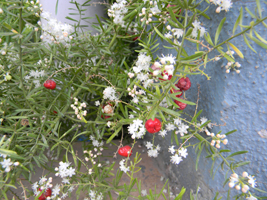
Overview
- Latin name – Asparagus Racemosus
- English name – Asparagus, Wild Asparagus, Asparagus Root
- Indian name – Shatavari
In Ayurveda this amazing herb is known as the “Queen of Herbs” because it promotes love and devotion Shatavari has a strong rejuvenating, nurturing, and stabilizing effect on excessive air, gas, dryness and agitation in the body and mind.
As such it is traditionally used for nervousness, anorexia, insomnia, hyperactive children, and people who are underweight. It promotes positive emotions while calming airy sensitivity and the fiery emotions such as irritability, anger, jealousy, resentment, and hatred. It also helps with pain, agitated sleep, disturbing dreams, and those who have weak emotional and physical heart.
Asparagus racemosus is a potent immunostimulant; Well-established pharmacological properties of Asparagus racemosus include adaptogenic, antioxidant, antiallergic, immunostimulation, uterine relaxation, anticancer, antiulcer, antimicrobial. Preclinical studies investigating the effect of Asparagus racemosus against the myelosuppressive effects of single and multiple doses of cyclophosphamide in mice shows that Asparagus racemosus prevented, to a significant degree, leucopenia produced by cyclophosphamide.
Plant Description
A tall climber with thin leaves. Roots are white, long and tapering at both ends. These roots come out in bunches and spread in the earth. Older plants have longer and thicker roots. Small white and fragrant flowers appear on this plant in the beginning of the rainy season. Fruits in the shape of small berries appear in the autumn.
Chemical Constituents
The plant contains triterpene saponins – Shatavarin I – IV, which are phytoestrogen compounds. The plant’s action as a galactagogue has been reported. In a study it was shown that in the estrogen – primed rats, Asparagus racemosus could cause both increase in the weight of mammary lobulo – alveolar tissue and the milk yield. Antioxytocic and anti ADH activity in the saponin fractions isolated from the roots of Asparagus racemosus has been observed. A study on the plant was shown to posses anabolic properties viz. growth promotion. The plant is also considered as an adaptogenic substance. Clinical efficacy of root powder evaluated in patients with duodenal ulcer.
Part Used
Roots
Benefits of Asparagus
The roots are bitter, sweet, emollient, antispasmodic, cooling, demulcent, diuretic, nervine, tonic, constipating or antidiarrhetic, opthalimic, galactagogue, nutritive, mucilaginous, refrigerant, aphrodisiac, stomachic and antidysenteric. They are useful in nervous disorders, dyspepsia, tumours, scalding of urine, throat infections, tuberculosis, cough bronchitis, general debility, muscle spasms, rheumatism, stomach ulcers, hematemesis, cancer – strengthens one from and for chemotherapy, convalescence, dehydration, diarrhea, dysentery, chronic fevers, herpes, hyperacidity, Immune system boost-good for AIDS, impotence, infertility, leucorrhoea and menopause.
Main Indications
- Aphrodisiac
- Galatagogue
- Male/Female infertility, Menopause
- General debility
Dosage
Asparagus Powder – 3-6 grams per day.
To buy Shatavari Powder, please visit store.planetayurveda.com/products/shatavari-powder
